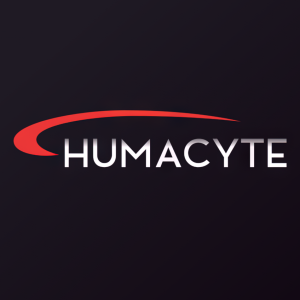Humacyte Announces Two Presentations at the VEITHsymposium® of Positive Clinical Results of the Human Acellular Vessel™ (HAV™) in the Treatment of Vascular Trauma
– Presentations included results from Phase 2/3 clinical trial and outcomes of real-world use of the HAV under a humanitarian aid program to treat wartime injuries in Ukraine –
– Results showed the HAV had higher rates of patency, and lower rates of amputation and infection, compared to historic synthetic graft benchmarks –
– BLA for an indication in vascular trauma planned to be filed with the FDA during the current quarter –
DURHAM, N.C., Nov. 17, 2023 (GLOBE NEWSWIRE) -- Humacyte, Inc. (Nasdaq: HUMA), a clinical-stage biotechnology platform company developing universally implantable, bioengineered human tissue at commercial scale, today announced the presentation of positive V005 Phase 2/3 clinical trial results of the investigational Human Acellular Vessel (HAV) in the treatment of vascular trauma, as well as results from the treatment of wartime injuries in Ukraine. The two presentations were made at the VEITHsymposium, a major vascular surgery conference in New York City. Results showed the HAV had higher rates of patency (blood flow), and lower rates of amputation and infection, compared to historic synthetic graft benchmarks. Humacyte plans to file a Biologics License Application (BLA) for the HAV for an indication in vascular trauma patients with the U.S. Food and Drug Administration (FDA) during the current quarter.
The V005 trial was a single-arm study conducted in the United States and Israel in patients with arterial injuries resulting from gun shots, workplace injuries, car accidents, or other traumatic events for whom the standard of care, saphenous vein, was not feasible or available to use as a bypass graft. As a single-arm study, the comparators for the HAV results were a systematic literature review and meta-analysis of studies conducted with synthetics grafts, providing a benchmark for comparison. A total of 69 patients were enrolled in the V005 trial, of which 51 had vascular injury of the extremities and comprised the primary evaluation group for the study. The V005 trial met its objectives, and the HAV demonstrated a higher 30-day secondary patency rate of
In the V005 trial, the most common reasons reported by clinicians for using the HAV instead of the standard of care, saphenous vein, was the need to avoid the time required to harvest saphenous vein (
“These results indicate that the HAV performed well in this vascular trauma population who were at a very high risk of limb loss due to the nature of their injuries,” said Ernest E. Moore, MD, FACS, Director of Research at the Ernest E. Moore Shock Trauma Center at Denver Health, a clinical investigator in the V005 trial. “These results are most notable considering the high risk of wound infection and immediate availability of a durable conduit. I look forward to the HAV being available in my practice.”
The FDA has advised Humacyte to include in the BLA submission patient outcomes from a humanitarian program conducted in Ukraine. Results for the 16 extremity patients from Ukraine who provided consent for use of their results in the BLA filing were also presented at the meeting, a set of data known as the “V017 trial.” The rate of success for treatment of patients with the HAV in the V017 trial was high, with a 30-day secondary patency of
“As a former Army surgeon, I appreciate the patient outcomes in Ukraine as I have seen first-hand too many front-line fighters who have had their lives cut short, or were forever damaged, as a result of the devastating wounds they suffered defending their country,” said Charles J. Fox, MD, FACS, Director of Vascular Surgery at the University of Maryland Capital Region, a clinical investigator in the V005 trial. “The HAV offered a new option to Ukraine’s war-wounded in the V017 trial and to civilian patients in the V005 trial, and I look forward to the advancements this technology may bring to the future of vascular regenerative medicine.”
Results of the V005 trial were presented by Dr. Fox in a podium presentation titled “Phase 2/3 Study for the Evaluation of Safety and Efficacy of HAV for Vascular Reconstruction in Patients with Limb or Life-Threatening Vascular Trauma.” Results from V005, the Ukraine humanitarian program, and statistical comparison to historic benchmarks were presented at a symposium titled “Vascular Trauma Repair Clinical Study Results with Humacyte Human Acellular Vessel (V005 & V017 Data)” by Dr. Moore, Dr. Fox, and Laura Niklason, MD, PhD, Chief Executive Officer of Humacyte.
There were no unexpected safety signals for the HAV in the V005 and V017 studies. Common adverse events reported were anemia, vascular graft thrombosis, blood loss anemia, pyrexia, thrombocytopenia, constipation, nausea peripheral edema, and tachycardia. There were four deaths among the extremity patients in the V005 trial, and zero deaths in the V017 trial. There were no deaths among extremity patients in the V005 trial attributed to the HAV. A meta-analysis combing the V005 and V017 trials showed a rate of death for extremity patients comparable to that historically reported for synthetic grafts, with a 30-day rate for the HAV of
The HAV, a bioengineered tissue, is under investigation as an infection-resistant alternative for revascularization. Designed to be ready off-the-shelf, the HAV has the potential to save valuable time for surgeons and to reduce discomfort and complications for patients. The HAV can be produced at commercial scale in Humacyte’s existing manufacturing facilities, which are expected to have the capacity to provide thousands of vessels for treating patients in need. The HAV has accumulated more than 1,000 patient-years of experience worldwide in a series of clinical trials in multiple indications, including vascular trauma repair, arteriovenous access for hemodialysis, and peripheral artery disease.
The HAV is an investigational product and has not been approved for sale by the FDA or any other regulatory agency.
About Humacyte
Humacyte, Inc. (Nasdaq: HUMA) is developing a disruptive biotechnology platform to deliver universally implantable bioengineered human tissues, advanced tissue constructs, and organ systems designed to improve the lives of patients and transform the practice of medicine. The company develops and manufactures acellular tissues to treat a wide range of diseases, injuries, and chronic conditions. Humacyte’s initial opportunity, a portfolio of HAVs, is currently in late-stage clinical trials targeting multiple vascular applications, including vascular trauma repair, AV access for hemodialysis, and peripheral arterial disease. Preclinical development is also underway in coronary artery bypass grafts, pediatric heart surgery, treatment of type 1 diabetes, and multiple novel cell and tissue applications. Humacyte’s 6mm HAV for AV access in hemodialysis was the first product candidate to receive the FDA’s Regenerative Medicine Advanced Therapy (RMAT) designation and has also received FDA Fast Track designation. Humacyte’s 6mm HAV for urgent arterial repair following extremity vascular trauma also has received an RMAT designation. The HAV received priority designation for the treatment of vascular trauma by the U.S. Secretary of Defense. For more information, visit www.Humacyte.com.
Forward-Looking Statements
This press release contains forward-looking statements that are based on beliefs and assumptions and on information currently available. In some cases, you can identify forward-looking statements by the following words: “may,” “will,” “could,” “would,” “should,” “expect,” “intend,” “plan,” “anticipate,” “believe,” “estimate,” “predict,” “project,” “potential,” “continue,” “ongoing” or the negative of these terms or other comparable terminology, although not all forward-looking statements contain these words. These statements involve risks, uncertainties, and other factors that may cause actual results, levels of activity, performance, or achievements to be materially different from the information expressed or implied by these forward-looking statements. Although we believe that we have a reasonable basis for each forward-looking statement contained in this press release, we caution you that these statements are based on a combination of facts and factors currently known by us and our projections of the future, about which we cannot be certain. Forward-looking statements in this press release include, but are not limited to, statements regarding the initiation, timing, progress, and results of our preclinical and clinical trials; the anticipated characteristics and performance of our HAVs; our ability to successfully complete, preclinical and clinical trials for our HAVs; the anticipated benefits of our HAVs relative to existing alternatives; the anticipated commercialization of our HAVs and our ability to manufacture at commercial scale; the implementation of our business model and strategic plans for our business; the timing or likelihood of regulatory filings and approvals, including the BLA for our V005 clinical trial; timing, scope, and rate of reimbursement for our HAVs; and our estimated available market opportunity. We cannot assure you that the forward-looking statements in this press release will prove to be accurate. These forward-looking statements are subject to a number of significant risks and uncertainties that could cause actual results to differ materially from expected results, including, among others, changes in applicable laws or regulations, the possibility that Humacyte may be adversely affected by other economic, business, and/or competitive factors, and other risks and uncertainties, including those described under the header “Risk Factors” in our Annual Report on Form 10-K for the year ended December 31, 2022 and in our Quarterly Report on Form 10-Q for the quarter ended June 30, 2023, each filed by Humacyte with the SEC, and in future SEC filings. Most of these factors are outside of Humacyte’s control and are difficult to predict. Furthermore, if the forward-looking statements prove to be inaccurate, the inaccuracy may be material. In light of the significant uncertainties in these forward-looking statements, you should not regard these statements as a representation or warranty by us or any other person that we will achieve our objectives and plans in any specified time frame, or at all. Except as required by law, we have no current intention of updating any of the forward-looking statements in this press release. You should, therefore, not rely on these forward-looking statements as representing our views as of any date subsequent to the date of this press release.
Humacyte Investor Contact:
Joyce Allaire
LifeSci Advisors LLC
+1-617-435-6602
jallaire@lifesciadvisors.com
investors@humacyte.com
Humacyte Media Contact:
Rich Luchette
Precision Strategies
+1-202-845-3924
rich@precisionstrategies.com
media@humacyte.com








